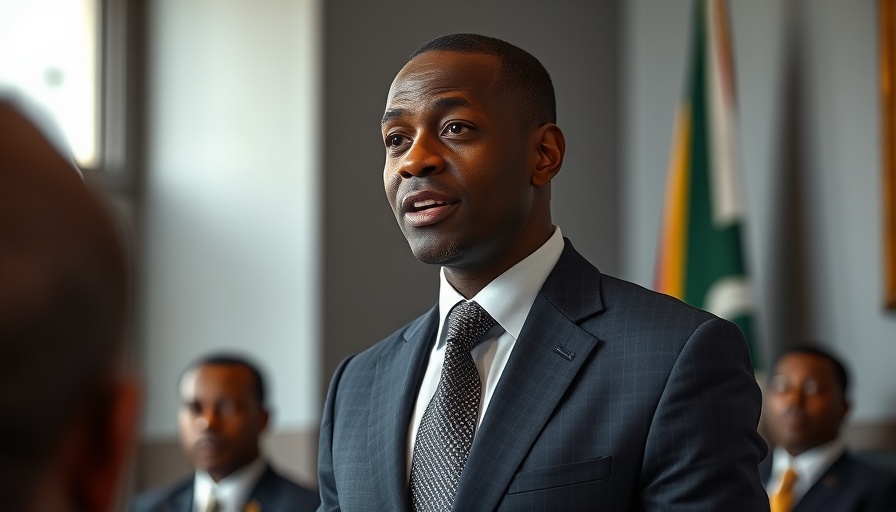
The National Dialogue: A New Dawn for South Africa's Governance
In a bold and transformative announcement, President Cyril Ramaphosa has set the stage for a National Dialogue intended to reshape South Africa's political landscape. This multi-phased initiative aims to give voice to the electorate, stimulate robust debates, and foster inclusive governance. With upcoming local consultations, sectoral engagements, and a pivotal National Convention scheduled for August 15, the process promises to encompass the diverse viewpoints that reflect the essence of South African society.
Understanding the National Dialogue Process
The National Dialogue will not be a fleeting event but a comprehensive process involving extensive discussions across provinces. Organized consultations will begin at grassroots levels—within communities, workplaces, and places of worship—where citizens can express their views and aspirations. Ramaphosa's vision underscores the need for a participatory democracy that resonates with the voices often marginalized in the political discourse. This initiative aligns with the broader goals of Political Realignment in the wake of tensions among coalition partners, including the African National Congress (ANC), the Democratic Alliance (DA), and the Economic Freedom Fighters (EFF).
Implications of the National Convention
The dedicated National Convention will act as a crucible for ideas and proposals unearthed during the review period. These discussions will culminate in another national gathering slated for early next year, synthesizing public input into actionable policy. The approach aligns with expectations leading up to the 2024 general elections, where many South Africans are looking for substantive changes in governance that address pressing issues such as youth unemployment, systemic income inequality, and racial reconciliation.
The Role of Opposing Forces
In navigating these complex political waters, Ramaphosa will also have to contend with opposition. Leaders like John Steenhuisen of the DA and Julius Malema of the EFF will undoubtedly play significant roles, either as antagonists or allies, in shaping public discourse. The dynamics within the Coalition Government of National Unity (GNU) and factions that emerged from Jacob Zuma's presidency underscore the challenges ahead. Active engagement from opposition parties is essential in ensuring the dialogue addresses the needs of all citizens, reflecting a true democratic ethos.
Prioritizing Critical National Issues
Key topics likely to arise during the National Dialogue span across critical national challenges:
- Economic Policy: Considering reforms in land ownership and economic empowerment.
- Social Grants: Re-evaluating support for vulnerable communities to enhance economic participation.
- Education Reform: Discussing the BELA Act to ensure quality learning opportunities for all.
Furthermore, as South Africa grapples with issues like police reform, energy crises a la Eskom, and climate change policy, the dialogue will serve as a platform for devising holistic solutions. Inclusion of various stakeholders—civic organizations, grassroots movements, trade unions, and experts—will be critical in navigating these challenges and fostering a comprehensive national strategy.
Anticipating the Future: A Call for Engagement
For citizens eager to influence their future, the National Dialogue presents a rare opportunity. Engaging in this process can empower individuals to champion their communities' needs, paving the way for a more equitable and accountable governance structure. The dialogue will not only seek to resolve immediate concerns facing the nation but also lay down a foundational path for future partnerships and policies aligned with social justice, economic stability, and systemic reform.
Take Action: Shape the Conversation
As we stand on the brink of a significant political movement, it is crucial for South Africans across all spectrums to be part of this dialogue. Engage in conversations in your communities, attend local consultations, and voice your concerns. Your participation is vital in steering the future of South Africa toward a more just and inclusive governance.
Conclusion: Why This Dialogue Matters
In conclusion, the National Dialogue initiated by President Ramaphosa represents a watershed moment in South Africa's democratic journey. It offers a mechanism for collective problem-solving and encourages a political culture where accountability and inclusivity can thrive. As the nation prepares for the 2024 general elections, now is the time for collective action and engagement to ensure that every South African has a stake in defining the country's path forward.
 Add Row
Add Row  Add
Add 




Write A Comment